|
|
|
Sort Order |
|
|
|
Items / Page
|
|
|
|
|
|
|
| Srl | Item |
| 1 |
ID:
096184


|
|
|
| 2 |
ID:
082760
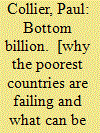

|
|
|
|
|
| Publication |
Oxford, Oxford University Press, 2007.
|
| Description |
xiii, 205p.
|
| Standard Number |
9780195311457
|
|
|
|
|
|
|
|
|
|
|
|
Copies: C:1/I:0,R:0,Q:0
Circulation
| Accession# | Call# | Current Location | Status | Policy | Location |
| 053665 | 338.90091724/COL 053665 | Main | On Shelf | General | |
|
|
|
|
| 3 |
ID:
120118
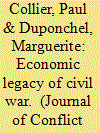

|
|
|
|
|
| Publication |
2013.
|
| Summary/Abstract |
This article positions itself among the very rare microeconomic analyses on the consequences of civil war. Up to now, most analyses on this topic are based on household surveys. The originality of the present study is that it investigates for the first time the likely predominant route by which civil conflict affects the economy, specifically through firms. The context of the study is Sierra Leone, a country that was ravaged by violent conflict from 1991 to 2002. The approach is to use geographical variations in the intensity of conflict to estimate the impact of violence on firms, on which we have data from the World Bank 2007 Employers' Survey. The proposed theory is that during conflict, violence affects production through a form of technical regress and demand through a reduction in income. The persistent post-conflict effects are less obvious. We assume that war forces a prolonged contraction in output skills, which slows the pace of recovery. We termed this phenomenon "forgetting by not doing". The results confirm our theory: the size of firms in 2006 is negatively affected by the intensity of the war in the area it operates. The analysis of training needs clearly corroborates the long-lasting lack of skills experienced as a result of the war in areas where the conflict was more intense. Yet, the analysis cannot identify robust recovery patterns.
|
|
|
|
|
|
|
|
|
|
|
|
|
|
|
|
| 4 |
ID:
141559
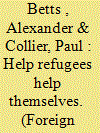

|
|
|
|
|
| Summary/Abstract |
There are now some 60 million displaced people around the world, more than at any time since World War II. The Syrian crisis alone, which has created the largest refugee shock of the era, has displaced some ten million people, around four million of them across international borders. In recent months, Western attention has focused almost exclusively on the flood of these refugees to Europe. Yet most of the Syrian refugees have been taken in not by Western countries but by Syria’s neighboring states: Jordan, Lebanon, and Turkey, whose capacity has been overwhelmed. Lebanon, with a population of around four million and a territory smaller than Maryland, is hosting over a million Syrian refugees. Young people are overrepresented in the refugee population, so that more than half of the school-aged children in Lebanon are now Syrian.
|
|
|
|
|
|
|
|
|
|
|
|
|
|
|
|
| 5 |
ID:
052693
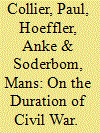

|
|
|
|
|
| Publication |
Mar 2004.
|
| Summary/Abstract |
This article explores empirically the duration of civil war. It relates the duration of civil war to two alternative models of conflict and culls testable hypotheses from the case study literature on civil war. Using a comprehensive dataset on large-scale violent civil conflicts covering the 1960-2000 period, a wide range of hypotheses are tested by means of hazard function regressions. The results show that the duration of conflict is systematically related both to structural conditions prevailing prior to conflict and to circumstances during conflict. The key structural characteristics that lengthen conflict are low per capita income, high inequality and a moderate degree of ethnic division. The key variable characteristics that shorten conflict are a decline in the prices of the primary commodities that the country exports and external military intervention on the side of the rebels. Furthermore, the results indicate that the chances of peace were much lower in the 1980s and 1990s than they had been previously. Three empirical explanations are suggested as different approaches to civil war: rebellion-as-investment, in which the critical incentive is the post-conflict payoff; rebellion-as-business, in which the critical incentive is the payoff during conflict; and rebellion-as-mistake, in which military optimism prevents the recognition of any mutually advantageous settlement. The article concludes that the empirical evidence is incompatible with the first of these approaches but consistent with the others.
|
|
|
|
|
|
|
|
|
|
|
|
|
|
|
|
| 6 |
ID:
102898


|
|
|
|
|
| Publication |
London, Allen Lane, 2010.
|
| Description |
xv, 271p.
|
| Standard Number |
9781846142239, hbk
|
|
|
|
|
|
|
|
|
|
|
|
Copies: C:1/I:0,R:0,Q:0
Circulation
| Accession# | Call# | Current Location | Status | Policy | Location |
| 055835 | 303.49/COL 055835 | Main | On Shelf | General | |
|
|
|
|
| 7 |
ID:
065099


|
|
|
|
|
| Publication |
Hampshire, Palgrave Macmillan, 2005.
|
| Description |
xxv, 272p.
|
| Standard Number |
140394346X
|
|
|
|
|
|
|
|
|
|
|
|
Copies: C:1/I:0,R:0,Q:0
Circulation
| Accession# | Call# | Current Location | Status | Policy | Location |
| 050019 | 330.96/FOS 050019 | Main | On Shelf | General | |
|
|
|
|
| 8 |
ID:
083245


|
|
|
|
|
| Publication |
2008.
|
| Summary/Abstract |
Post-conflict societies face two distinctive challenges: economic recovery and reduction of the risk of a recurring conflict. Aid and policy reforms have been found to be effective in economic recovery. In this article, the authors concentrate on the other challenge - risk reduction. The post-conflict peace is typically fragile: nearly half of all civil wars are due to post-conflict relapses. The authors find that economic development substantially reduces risks, but it takes a long time. They also find evidence that UN peacekeeping expenditures significantly reduce the risk of renewed war. The effect is large: doubling expenditure reduces the risk from 40% to 31%. In contrast to these results, the authors cannot find any systematic influence of elections on the reduction of war risk. Therefore, post-conflict elections should be promoted as intrinsically desirable rather than as mechanisms for increasing the durability of the post-conflict peace. Based on these results, the authors suggest that peace appears to depend upon an external military presence sustaining a gradual economic recovery, with political design playing a somewhat subsidiary role. Since there is a relationship between the severity of post-conflict risks and the level of income at the end of the conflict, this provides a clear and uncontroversial principle for resource allocation: resources per capita should be approximately inversely proportional to the level of income in the post-conflict country.
|
|
|
|
|
|
|
|
|
|
|
|
|
|
|
|
| 9 |
ID:
064826


|
|
|
| 10 |
ID:
066485


|
|
|
|
|
| Publication |
Washington, The World Bank, 2005.
|
| Description |
v.1 (xv, 353); v.2 (xv, 349p.)
|
| Contents |
Vol.1: Africa
Vol.2: Europe, Central Asia and other regions
|
| Standard Number |
0821360477
|
|
|
|
|
|
|
|
|
|
|
|
Copies: C:2/I:0,R:0,Q:0
Circulation
| Accession# | Call# | Current Location | Status | Policy | Location |
| 050315 | 330.9/COL 050315 | Main | On Shelf | General | |
| 050316 | 330.9/COL 050316 | Main | On Shelf | General | |
|
|
|
|
| 11 |
ID:
021417
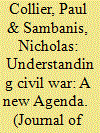

|
|
|
|
|
| Publication |
Feb 2002.
|
| Description |
3-12
|
|
|
|
|
|
|
|
|
|
|
|
|
|
|
|
| 12 |
ID:
089706


|
|
|
|
|
| Publication |
London, Bodley Head, 2009.
|
| Description |
viii, 255p.
|
| Standard Number |
9781847920225
|
|
|
|
|
|
|
|
|
|
|
|
Copies: C:1/I:0,R:0,Q:0
Circulation
| Accession# | Call# | Current Location | Status | Policy | Location |
| 054332 | 324/COL 054332 | Main | On Shelf | General | |
|
|
|
|
|
|
|
|
|